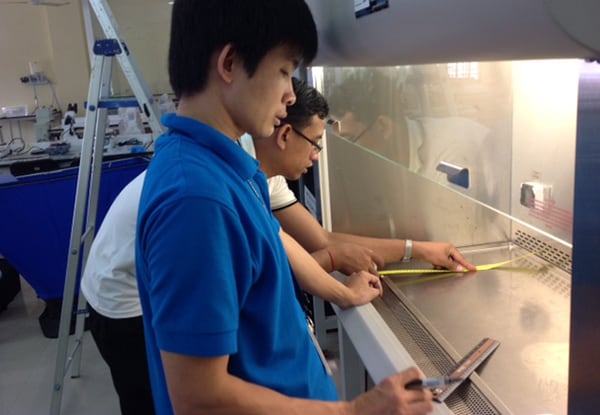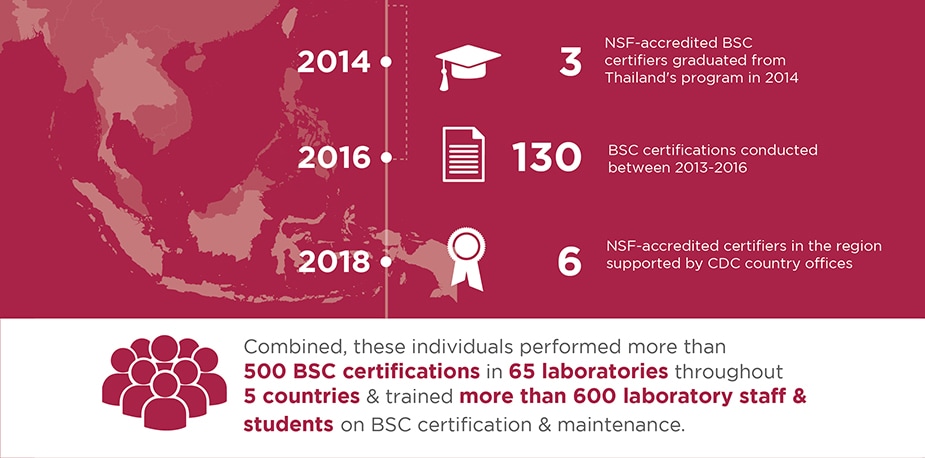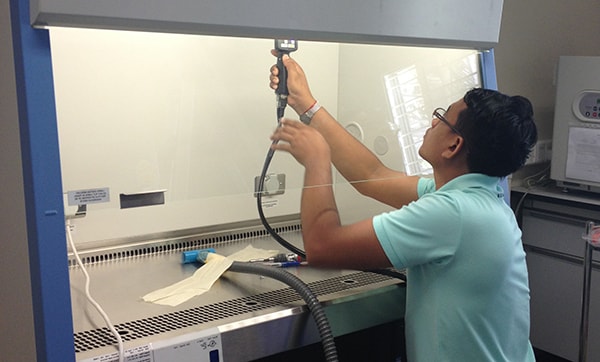Keeping Safe around Highly Dangerous Pathogens and Toxins
April 30, 2019

NAMRU-2 staff learning how to measure the airflow of biological safety cabinets. Photo: Anek Kaewpan
Southeast Asia faces numerous health security challenges, including novel disease threats, growing antimicrobial resistance, and increasing numbers of laboratories working with dangerous bacteria and viruses.
To enhance laboratory safety and biosecurity, nations in the region are focusing on the certification of biological safety cabinets (BSCs), passing legislation to improve biosafety, and promoting partnerships among public health institutions to strengthen their collective ability to respond to disease threats.
Certification of BSCs—enclosed, ventilated laboratory workspaces—protects laboratorians from infection, laboratory specimens and materials from contamination, and the public from the consequences of unintentionally released dangerous pathogens. In 2012, the CDC office in Thailand (CDC Thailand) established a BSC-certification training program with the Thai National Institute of Health and National Institute of Animal Health. The program was certified by NSF International (NSF), an organization that develops public health standards and certifies programs. In 2013, this program was expanded to Cambodia, with the US Department of Defense’s Naval Medical Research Unit No. 2 (NAMRU-2) and the Cambodian Ministry of Health (MOH) as key partners. CDC’s Cambodia office has since assumed responsibility for BSC work in the country.

Three NSF-accredited BSC certifiers graduated from Thailand’s program in 2014, one of whom qualified as a mentor to future trainees. The CDC Thailand–based mentor then trained two staff from NAMRU-2 in Cambodia, and together they performed 130 BSC certifications between 2013 and 2016. In 2016, some NAMRU-2 staff became registered BSC certifiers through NSF, and one qualified as a mentor. Since then, one more NAMRU-2 staff was NSF-accredited as a certifier. By the end of 2018, CDC country offices supported six NSF-accredited certifiers in the region; combined, these individuals have performed more than 500 BSC certifications in 65 laboratories throughout five countries and trained about 600 laboratory staff and students on BSC certification and maintenance.
LAWS IN LABS

Testing for leaks on a high efficiency air filter of a biological safety cabinet. Photo: Anek Kaewpan
Cambodia complemented their work in BSC certification with support for improved national legislation. Laboratory biosafety and biosecurity regulations are essential to government oversight and laboratory accountability. In November 2017, laboratory leaders from the Cambodian MOH partnered with technical experts from across CDC to hold a workshop on strengthening biosafety and biosecurity practices within the country’s national laboratory network.
The workshop focused on the role of law as a public health tool and outlined a prakas, or ministerial proclamation, for the management of highly dangerous pathogens and toxins by laboratories. This prakas, when passed, will be the first regulation within the Cambodian MOH created to improve laboratory safety; the prakas will cover the possession, use, storage, and transfer of dangerous biological pathogens within public health laboratories. The partnerships that CDC offices built with countries across the Southeast Asia region—Cambodia, Laos, Burma (Myanmar), Thailand,and Vietnam—are critical for building the regional capacity to manage and maintain safe and secure laboratories upon which global health security depends.